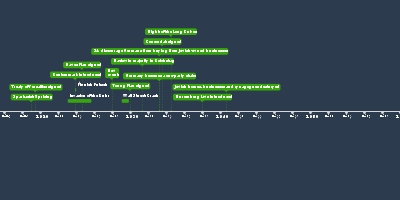Invasion of the Ruhr (11 ene 1923 año – 25 agos 1925 año)
Descripción:
In 1922, the Weimar Government stated that it would not be able to pay the next three years’ instalments as a result of economic hardship.The French believed that the Weimar Government could pay and that it was testing international patience.
French and Belgian armies sent 60,000 soldiers into the Ruhr region of Germany.
The French aimed to extract the unpaid reparations and took control of key industries and natural resources.
The Weimar Government instructed the Ruhr workers to go on strike, instead of helping the French.
This worsened the economic crisis in Germany. Government income from the Ruhr, one of Germany's most industrialised areas, was down. The Government started to print more money in order to pay the striking German workers in the Ruhr.
The inflation rate rose so dramatically that the German currency lost virtually all value. Paper money was practically worthless (eg. a loaf of bread which cost 250 marks in January 1923 had risen to 200,000 million marks by November 1923).
Any German with savings lost the most, as their money lost its value.
The elderly suffered greatly as their income was fixed.
Germans who were paid monthly were also affected, as the value of their money would decrease a great deal before they were paid again.
Those who were paid weekly, or who could renegotiate their pay daily, were better off.
Those who had taken out loans, found it much easier to pay them back. The upper class landowners did not suffer many of the effects of the hyperinflation.
There were food shortages as businesses did not have enough money to purchase produce from farmers.
There was a rise in crime as Germans became desperate.
Añadido al timeline:
fecha:
11 ene 1923 año
25 agos 1925 año
~ 2 years and 7 months
